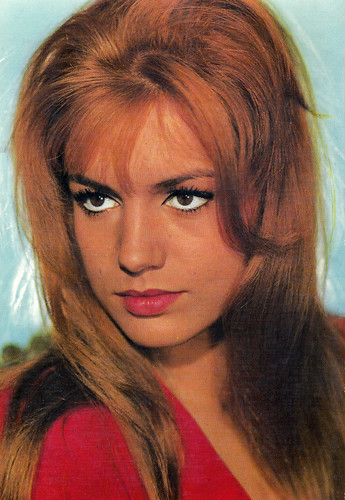
Italian postcard by Rotalfoto (Rotalcolor), Milano, no. 244.

Romanian postcard by Casa Filmului Acin, no. 519.
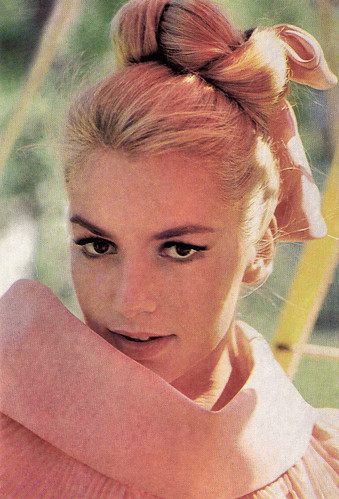
Romanian postcard by Casa Filmului Acin, no. 91.
The niece of the Belgian prime minister
Catherine Spaak was born in Boulogne-Billancourt, France in 1945. Her father was the Belgian critic and screenwriter Charles Spaak, her mother the actress Claudie Clèves and her sister is actress-photographer Agnès Spaak.
As a teenager, Catherine started her career with small roles in French films like the short L’hiver/The winter (Jacques Gautier, 1959) and the thriller Le Trou/Nightwatch (Jacques Becker, 1960).
When she moved to Italy later that year, her father introduced her to film director Alberto Lattuada, who cast her in his film I dolci inganni/Sweet Deceptions (Alberto Lattuada, 1960). That coming of age film made her a star in Italy. She played a young Roman girl in love, who spends the day observing other lovers' behaviours and considering whether she is ready to jump.
J.C. Mohsen at IMDb: “This film's unpredictability is refreshing. Whether written or filmed, coming-of-age stories often fail to surprise or intrigue the audience. In I Dolci Inganni, most characters seem at first to be crazily entertaining walking clichés, but they later astonish the audience by revealing their depth and their inner struggles.”
From age 15 to 18, Spaak was the lead actress in a dozen films, including La voglia matta/Crazy Desire (Luciano Salce, 1961) opposite Ugo Tognazzi, the classic comedy Il sorpasso/The Easy Life (Dino Risi, 1962) with Vittorio Gassman, La parmigiana/The Girl from Parma (Antonio Pietrangeli, 1963) with Nino Manfredi, and the Alberto Moravia adaptation La noia/The Empty Canvas (Damiano Damiani, 1963) with Horst Buchholz and Bette Davis.
For her performance in La noia she was awarded the David di Donatello, the Italian Oscar, in 1964. Spaak often played the Lolita-type who seduced men, and the Italian scandal press wrote about herself in that way. In their articles, journalists always included that she was the niece of the Belgian prime minister, Paul-Henri Spaak.
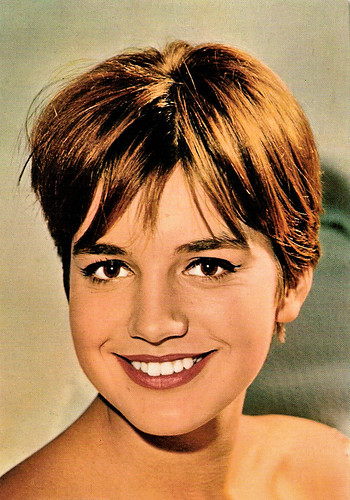
Italian postcard by Rotalfoto, Milano, no. 194.
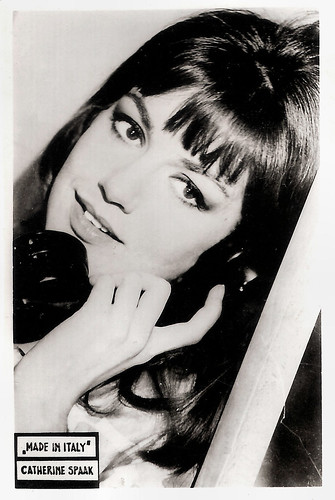
Small Romanian collectors card. Photo: Catherine Spaak in Made in Italy (Nanni Loy, 1965).
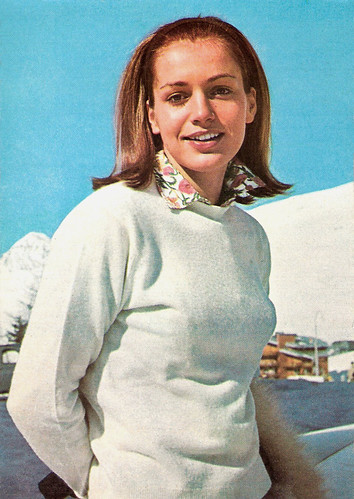
Italian postcard by Edizione diesse.
Highlights of the Commedia all'Italiana
Catherine Spaak’s screen success, combined with her love of singing and guitar playing, led to an offer from the Ricordi label in 1962. She recorded covers of Françoise Hardy's originals and songs in Hardy’s style.
Ready steady girls!, the site on Europe’s fab female singers of the 1960s in their bio: “Perdono – written by Gino Paoli (who had worked with stars such as Mina) and arranged by Ennio Morricone – was issued as her debut single and swiftly made the Italian top 20.
Ready steady girls!, the site on Europe’s fab female singers of the 1960s in their bio: “Perdono – written by Gino Paoli (who had worked with stars such as Mina) and arranged by Ennio Morricone – was issued as her debut single and swiftly made the Italian top 20.
Vocally, Catherine drew comparisons with France’s newest star, Françoise Hardy, so Ricordi opted to have their young signing record a couple of Hardy songs for the Italian market. Issued in 1963, the bilingual 'Tous les garçons et les filles' (Quelli della mia età) – backed with J’ai jeté mon coeur (Ho scherzato con il cuore) – gave Hardy’s original a run for its money, reaching number seven in September 1963 and confirming Catherine as a new star.”
In 1964, she returned to France to appear in La Ronde (Roger Vadim, 1964) and the war drama Week-end à Zuydcoote/Weekend at Dunkirk (Henri Verneuil, 1964) starring Jean-Paul Belmondo.
Back in Italy she played in some more highlights of the Commedia all'Italiana such as L'armata Brancaleone/Brancaleone's Army (Mario Monicelli, 1965) featuring Vittorio Gassman, and Made in Italy (Nanni Loy, 1965).
Other notable appearances include L'uomo dei cinque palloni/Break up (Marco Ferreri, 1965) starring Marcello Mastroianni, and La matriarca/The Libertine (Pasquale Festa Campanile, 1968) with Jean-Louis Trintignant.
In 1967 she went to Hollywood to play Rod Taylor’s love interest in Hotel (Richard Quine, 1967), based on the novel by Arthur Hailey. Hal Erickson at AllMovie: “Once she came to Hollywood, however, Spaak was packaged and promoted as just another foreign starlet, interchangeable with Claudia Cardinale, Camilla Sparv, Elke Sommer and the rest of the batch.”
The result was not a success and soon she was back in Italy. Two years later she did a cameo in another Hollywood production, If It's Tuesday, This Must Be Belgium (Mel Stuart, 1969).

Romanian postcard by Casa Filmului Acin, no. 25. Photo: Catherine Spaak and Philippe Leroy in the crime comedy La notte è fatta per... rubare/Night Is Made for Stealing (Giorgio Capitani, 1968).
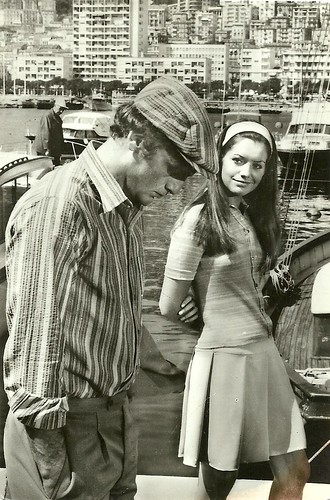
Romanian postcard by Casa Filmului Acin, no. 105. Catherine Spaak and Philippe Leroy in La notte è fatta per... rubare/Night Is Made for Stealing (Giorgio Capitani, 1968), which evolves in Montecarlo.

East-German postcard by VEB Progress Film-Vertrieb, Berlin, no. 24/69, 1969. Retail price: 0,20 DM. Photo: Catherine Spaak in La notte è fatta per... rubare /Night Is Made for Stealing (Giorgio Capitani, 1968).
Seeking a new direction, Catherine Spaak joined fellow singer Johnny Dorelli in the operetta 'La vedova allegra' (The Merry Widow) in 1968. The pair went on to enjoy a lasting relationship, both personally and professionally. They enjoyed success as a duo with 'Song sung blue' (1972) and 'Una serata insieme a te' (1973).
During the early 1970s, she continued to appear in many Italian films, but they became less interesting. She starred with Karl Malden and James Franciscus in the Giallo Il gatto a nove code/The Cat o' Nine Tails (Dario Argento, 1971). A reviewer at IMDb calls it "An entertaining and clever thriller that's well worth a look."
In France she made the crime film Un meurtre est un meurtre/A Murder Is a Murder... Is a Murder (Étienne Périer, 1972) with Jean-Claude Brialy. In the American-Italian Western Take a Hard Ride (Antonio Margheriti, 1975), she co-starred with Jim Brown and Lee van Cleef.
From then on, her film appearances became more incidental. In 1978, she had success on stage in the musical 'Cyrano', and would continue to play on stage. She hosted several Italian TV shows such as Forum (1985-1988) and Harem (1989-2002) and wrote articles for the newspaper Il corriere della sera and Italian magazines. She also published six books in Italian, such as '26 Donne' (26 women, 1984), 'Un cuore perso' (A lost heart, 1996), 'Lui' (He, 2006) and 'L’amore blu'(Blue Love, 2011).
Her later films include the sex comedy anthology Sunday Lovers (Bryan Forbes, Edouard Molinaro, Dino Risi, Gene Wilder, 1980) as Ugo Tognazzi’s psychoanalyst, Scandalo Segreto/Secret Scandal (Monica Vitti, 1989) and Tandem (Lucio Pellegrini, 2000) starring the comic duo Luca & Paolo.
More recently she was seen in the film Alice (Oreste Crisostomi, 2009), the BBC mini-series Zen (John Alexander, Jon Jones, Christopher Menaul, 2011) starring Rufus Sewell as detective Aurelio Zen and Spaak as his Mamma, and the film I più' grandi di tutti/The greatest of all (Carlo Virzì, 2012).
Catherine Spaak was married to actor and producer Fabrizio Capucci (1963-1971) and Italian singer-actor Johnny Dorelli (1972-1979). Her last husband was actor Orso Maria Guerrini. With Capucci, she had a daughter, stage actress Sabrina Capucci (1963), and with Dorelli a son, Gabriele Dorelli. Spaak died in 2022 at the age of 77, having previously suffered two brain hemorrhages.
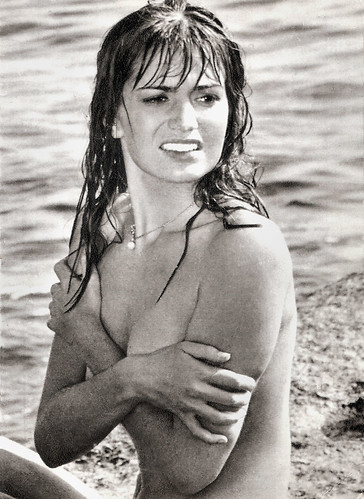
Italian collectors card by La Rotografica Romana. Edito dalla Nat Nuova Alta Tensione.
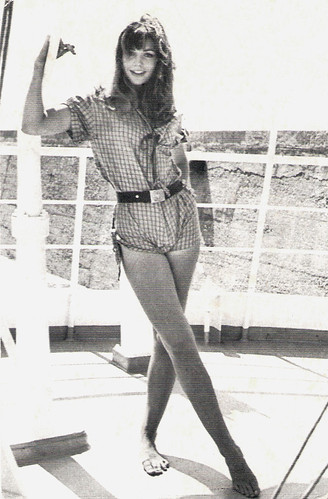
Romanian postcard by Casa Filmului Acin.
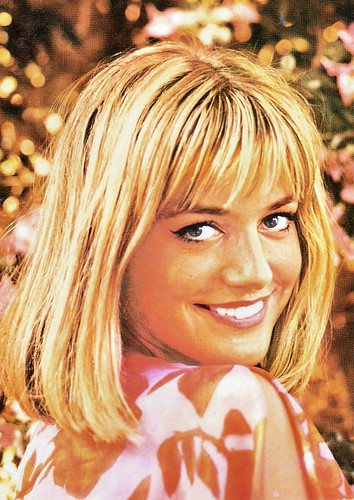
Romanian postcard by Casa Filmului Acin.

Romanian postcard by Casa Filmului Acin.
Sources: Hal Erickson (AllMovie), CatherineSpaak.eu, Ready Steady Girls!, Wikipedia (Italian, French, German and English) and IMDb.
In 1964, she returned to France to appear in La Ronde (Roger Vadim, 1964) and the war drama Week-end à Zuydcoote/Weekend at Dunkirk (Henri Verneuil, 1964) starring Jean-Paul Belmondo.
Back in Italy she played in some more highlights of the Commedia all'Italiana such as L'armata Brancaleone/Brancaleone's Army (Mario Monicelli, 1965) featuring Vittorio Gassman, and Made in Italy (Nanni Loy, 1965).
Other notable appearances include L'uomo dei cinque palloni/Break up (Marco Ferreri, 1965) starring Marcello Mastroianni, and La matriarca/The Libertine (Pasquale Festa Campanile, 1968) with Jean-Louis Trintignant.
In 1967 she went to Hollywood to play Rod Taylor’s love interest in Hotel (Richard Quine, 1967), based on the novel by Arthur Hailey. Hal Erickson at AllMovie: “Once she came to Hollywood, however, Spaak was packaged and promoted as just another foreign starlet, interchangeable with Claudia Cardinale, Camilla Sparv, Elke Sommer and the rest of the batch.”
The result was not a success and soon she was back in Italy. Two years later she did a cameo in another Hollywood production, If It's Tuesday, This Must Be Belgium (Mel Stuart, 1969).

Romanian postcard by Casa Filmului Acin, no. 25. Photo: Catherine Spaak and Philippe Leroy in the crime comedy La notte è fatta per... rubare/Night Is Made for Stealing (Giorgio Capitani, 1968).

Romanian postcard by Casa Filmului Acin, no. 105. Catherine Spaak and Philippe Leroy in La notte è fatta per... rubare/Night Is Made for Stealing (Giorgio Capitani, 1968), which evolves in Montecarlo.

East-German postcard by VEB Progress Film-Vertrieb, Berlin, no. 24/69, 1969. Retail price: 0,20 DM. Photo: Catherine Spaak in La notte è fatta per... rubare /Night Is Made for Stealing (Giorgio Capitani, 1968).
The Cat of Nine Tails
Seeking a new direction, Catherine Spaak joined fellow singer Johnny Dorelli in the operetta 'La vedova allegra' (The Merry Widow) in 1968. The pair went on to enjoy a lasting relationship, both personally and professionally. They enjoyed success as a duo with 'Song sung blue' (1972) and 'Una serata insieme a te' (1973).
During the early 1970s, she continued to appear in many Italian films, but they became less interesting. She starred with Karl Malden and James Franciscus in the Giallo Il gatto a nove code/The Cat o' Nine Tails (Dario Argento, 1971). A reviewer at IMDb calls it "An entertaining and clever thriller that's well worth a look."
In France she made the crime film Un meurtre est un meurtre/A Murder Is a Murder... Is a Murder (Étienne Périer, 1972) with Jean-Claude Brialy. In the American-Italian Western Take a Hard Ride (Antonio Margheriti, 1975), she co-starred with Jim Brown and Lee van Cleef.
From then on, her film appearances became more incidental. In 1978, she had success on stage in the musical 'Cyrano', and would continue to play on stage. She hosted several Italian TV shows such as Forum (1985-1988) and Harem (1989-2002) and wrote articles for the newspaper Il corriere della sera and Italian magazines. She also published six books in Italian, such as '26 Donne' (26 women, 1984), 'Un cuore perso' (A lost heart, 1996), 'Lui' (He, 2006) and 'L’amore blu'(Blue Love, 2011).
Her later films include the sex comedy anthology Sunday Lovers (Bryan Forbes, Edouard Molinaro, Dino Risi, Gene Wilder, 1980) as Ugo Tognazzi’s psychoanalyst, Scandalo Segreto/Secret Scandal (Monica Vitti, 1989) and Tandem (Lucio Pellegrini, 2000) starring the comic duo Luca & Paolo.
More recently she was seen in the film Alice (Oreste Crisostomi, 2009), the BBC mini-series Zen (John Alexander, Jon Jones, Christopher Menaul, 2011) starring Rufus Sewell as detective Aurelio Zen and Spaak as his Mamma, and the film I più' grandi di tutti/The greatest of all (Carlo Virzì, 2012).
Catherine Spaak was married to actor and producer Fabrizio Capucci (1963-1971) and Italian singer-actor Johnny Dorelli (1972-1979). Her last husband was actor Orso Maria Guerrini. With Capucci, she had a daughter, stage actress Sabrina Capucci (1963), and with Dorelli a son, Gabriele Dorelli. Spaak died in 2022 at the age of 77, having previously suffered two brain hemorrhages.

Italian collectors card by La Rotografica Romana. Edito dalla Nat Nuova Alta Tensione.

Romanian postcard by Casa Filmului Acin.

Romanian postcard by Casa Filmului Acin.

Romanian postcard by Casa Filmului Acin.
Sources: Hal Erickson (AllMovie), CatherineSpaak.eu, Ready Steady Girls!, Wikipedia (Italian, French, German and English) and IMDb.
No comments:
Post a Comment